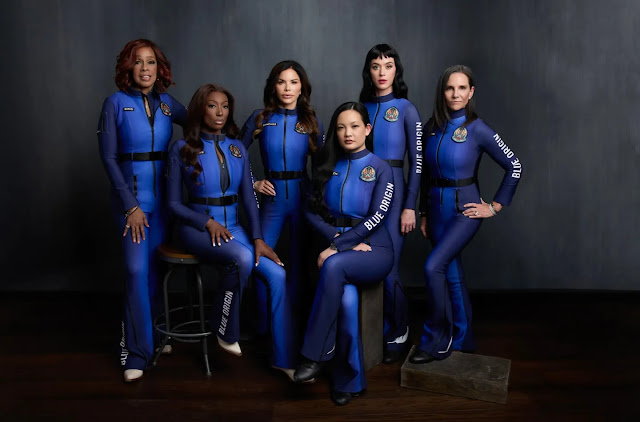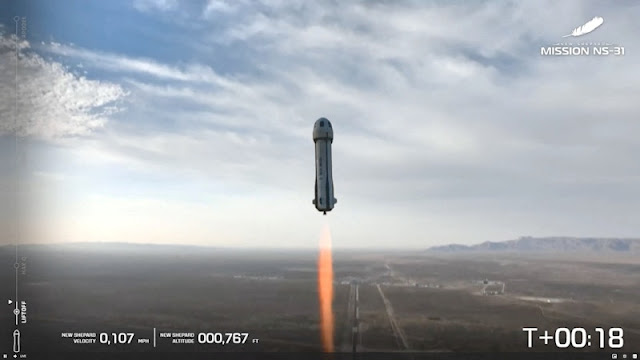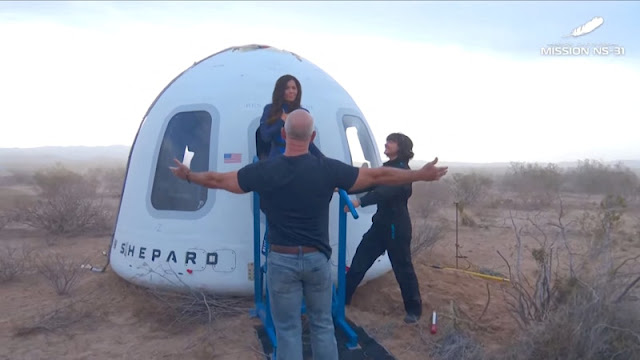It was the latest wave in space tourism, where more of the rich and famous than ever before — or lucky and well-connected — can enter the zero-gravity realm traditionally dominated by professional astronauts.
The New Shepard rocket blasted off on the quick up-and-down trip from West Texas. The fringes of space beckoned 66 miles (107 kilometers) up and provided a few precious minutes of weightlessness.
Sanchez, a helicopter pilot and former TV journalist, invited the others along for the 10-minute, fully automated flight, packing on the star power with singer-songwriter Perry and “CBS Mornings” co-host King. Moved by the views of Earth below, Perry said she couldn’t resist singing “What a Wonderful World” in space.
Also sharing the ride were film producer Kerianne Flynn; Aisha Bowe, a former NASA engineer who started her own companies to promote science education; and Amanda Nguyen, a scientist who studied planets around other stars and now advocates for survivors of sexual violence.
Blue Origin declined to say how much the flight cost or who paid what. The trip came two months before Sanchez and Bezos married in Venice.
It was the 11th human spaceflight for the Washington state-based company, founded by Bezos in 2000 after making a fortune with Amazon. Bezos strapped in for Blue Origin’s first space tourist flight in 2021 and accompanied the latest crew to the pad.
The celebrity launch was the nation’s first spaceflight where women filled each seat. The only other all-female crew in 64 years of human spaceflight was back in 1963. That’s when Soviet cosmonaut Valentina Tereshkova launched herself, becoming the first woman in space. Tereshkova spent three days off the planet.
Even after the latest launch, women represent barely 15% of the more than 700 people who have traveled into space. Sanchez said she deliberately chose women to launch with her, each of them eager to inspire both the young and old to dream big, and even commissioned special flight suits.
“It’s an important moment for the future of commercial space travel and for humanity in general and for women all around,” Perry told The Associated Press last week.
The launch brought out VIPs to West Texas including Oprah Winfrey, Kris Jenner and other members of the Kardashian family, and several women who previously have flown on private flights. Winfrey, a close friend of King, wiped away tears when the capsule reached space and the passengers were heard marveling at the moon and shouting with joy.
As the women were buckling up for the ride back, Perry broke into song. Despite urging by her crewmates, she resisted singing “Roar” or her other tunes and instead chose “What a Wonderful World.”
“It’s not about me. It’s not about singing my songs,” she said following the flight. “It’s about a collective energy in there. It’s about us.”
Bezos opened the capsule’s hatch minutes after touchdown, embracing Sanchez, the first one out. As they emerged, Perry and King kneeled and kissed the ground. “Oh my God, that was amazing,” said King, who considers herself an anxious airplane flyer.
This wasn’t the first Blue Origin launch with marquee names.
“Star Trek” actor William Shatner caught a lift to space with Blue Origin in 2021 at age 90, soon after Bezos’ inaugural trip. He was followed by former New York Giants defensive end and TV host Michael Strahan and Laura Shepard Churchley, the eldest daughter of Mercury astronaut Alan Shepard, for whom the rocket is named. Two aviation pioneers who missed out on space when they were younger — Wally Funk and Ed Dwight — also rocketed away at ages 82 and 90, respectively.
Most of Blue Origin’s passengers — 58 counting the latest launch — have been business or science types, TV hosts or YouTubers. Ticket prices are not disclosed.
The Russian Space Agency also has launched its share of space tourists, beginning with a California financier in 2001. Two decades later, a Russian actress filmed aboard the International Space Station.
Elon Musk’s SpaceX also sells multi-day trips to private customers. SpaceX’s first client to fly, billionaire tech entrepreneur Jared Isaacman already has launched twice and performed the first private spacewalk. He’s now set to become NASA’s next administrator if confirmed by the Senate.
Chinese-born bitcoin investor Chun Wang just returned from the first spaceflight to carry people over the north and south poles. Wang picked up the whole SpaceX tab for himself and three polar explorers for an undisclosed sum.
“In this exciting new era of commercial spaceflight, the dream of becoming an astronaut is no longer limited to a select few,” Wang said via X last week.
Excuse me while I watch @JeffBezos faceplant a million times pic.twitter.com/HiPamzEmD6
— Wu Tang is for the Children (@WUTangKids) April 14, 2025









Such a blisteringly loud cringe?
I’m not here to defend or debate it. I’m asking us to pay attention to the reaction. Because when the ridicule gets that loud, that fast, it’s worth asking: What just got triggered?
And more importantly, what are our daughters learning from it?
Set aside how you feel about billionaire-funded space travel—there are plenty of valid critiques. This isn’t about defending the mission. It’s about noticing the pattern.
There have been more than 20 privately funded spaceflights in recent years—some scientific, some symbolic, some just people chasing a view. Most were met with curiosity, maybe a few critiques, but rarely the kind of public ridicule we’re seeing now.
This time, six women went to space.
That’s the headline.
That’s also, it seems, the punchline.
So here’s a sincere question: why this mission?
When a group of women steps fully into an arena that has, for most of history, excluded them, the reaction gets loud.
The reaction wasn’t really about billionaires or tech moguls or marketing stunts.
It was grounded—more than anything else—in gender bias.
There have been plenty of these flights before.
The public response? Muted. Sometimes celebratory.
This one was different. That difference is the story.
And here’s what worries me most: when girls—your daughters, your nieces, our students—see that ridicule, they’re not weighing the merits or funding of space travel.
They’re encoding something much simpler—both specifically and generally.
Specifically: Don’t become an astronaut.
More broadly: Don’t do bold things in full view. Don’t be that visible. Don’t be that ambitious. Don’t be a tall poppy.
That message doesn’t just pass by—it gets stored.
It sticks.
This isn’t just about space.
It’s about the impulse—or the need—to shrink.
So the real question is:
What are we really reacting to—and who are we trying to put back in their place when we laugh?
This post is part of my ongoing series on logical fallacies and psychological biases—a project aimed at helping us clarify our thinking, so we can actually discuss what we say we’re discussing.
Because real debate starts with honest recognition of what’s really driving us.
NOTE: Before claiming no one on this flight had expertise, read about Amanda Nguyen—an astronaut with a background in astrophysics & bioastronautics, trained at NASA & Harvard. On Blue Origin’s NS-21, she became the 1st Vietnamese & SE Asian woman in space, conducting experiments on menstruation in microgravity & plant biology to address gender gaps in research. She also wrote & helped pass the Sexual Assault Survivors’ Bill of Rights & is a Nobel Peace Prize nominee for global work reforming rape laws. And Aisha Bowe —former NASA engineer with degrees in aerospace & space systems engineering from the Univ. of Michigan. She founded STEMBoard, created LINGO to expand STEM access, & on 4/14/25 became the 1st Bahamian-American woman in space.